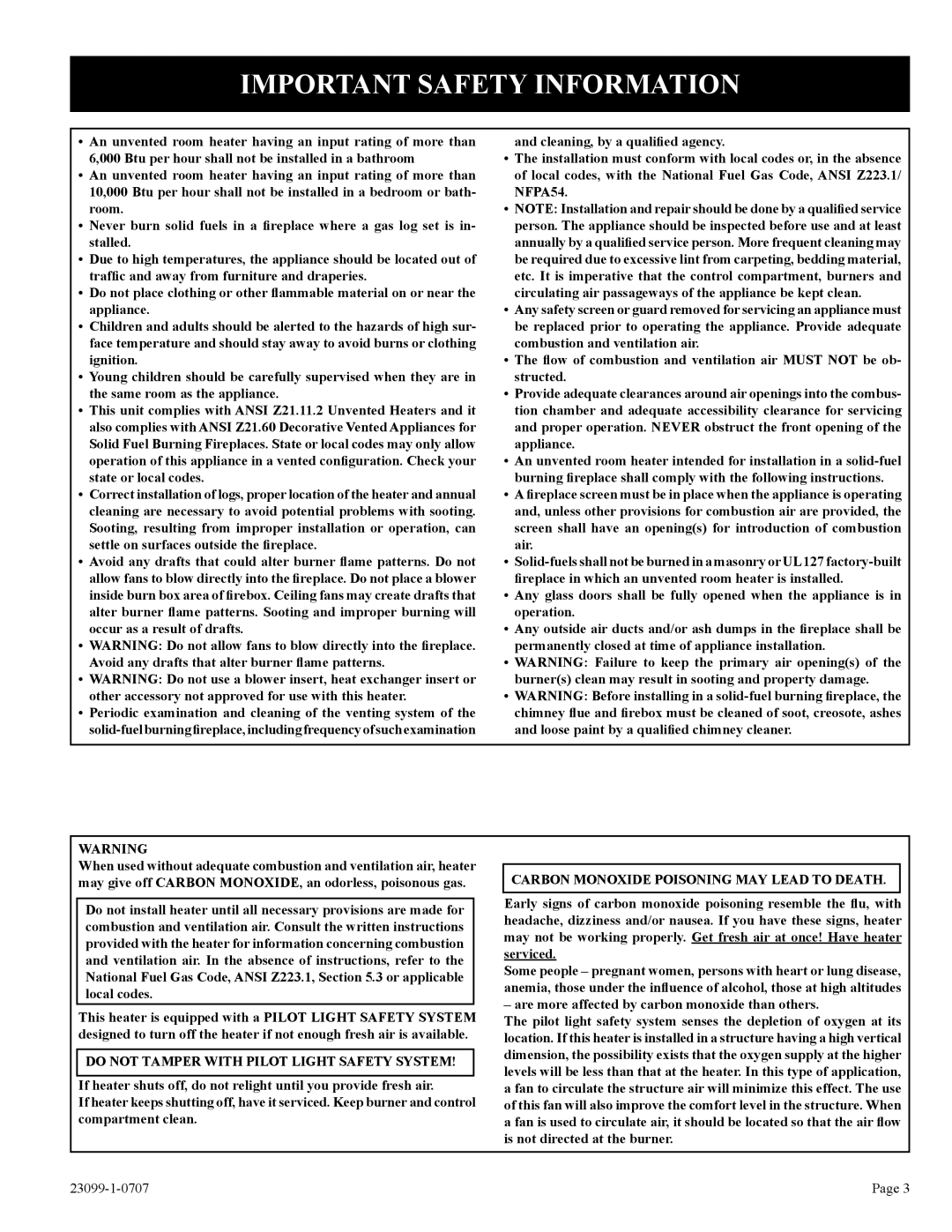
IMPORTANT SAFETY INFORMATION
•An unvented room heater having an input rating of more than 6,000 Btu per hour shall not be installed in a bathroom
•An unvented room heater having an input rating of more than 10,000 Btu per hour shall not be installed in a bedroom or bath- room.
•Never burn solid fuels in a fireplace where a gas log set is in- stalled.
•Due to high temperatures, the appliance should be located out of traffic and away from furniture and draperies.
•Do not place clothing or other flammable material on or near the appliance.
•Children and adults should be alerted to the hazards of high sur- face temperature and should stay away to avoid burns or clothing ignition.
•Young children should be carefully supervised when they are in the same room as the appliance.
•This unit complies with ANSI Z21.11.2 Unvented Heaters and it also complies with ANSI Z21.60 Decorative Vented Appliances for Solid Fuel Burning Fireplaces. State or local codes may only allow operation of this appliance in a vented configuration. Check your state or local codes.
•Correct installation of logs, proper location of the heater and annual cleaning are necessary to avoid potential problems with sooting. Sooting, resulting from improper installation or operation, can settle on surfaces outside the fireplace.
•Avoid any drafts that could alter burner flame patterns. Do not allow fans to blow directly into the fireplace. Do not place a blower inside burn box area of firebox. Ceiling fans may create drafts that alter burner flame patterns. Sooting and improper burning will occur as a result of drafts.
•WARNING: Do not allow fans to blow directly into the fireplace. Avoid any drafts that alter burner flame patterns.
•WARNING: Do not use a blower insert, heat exchanger insert or other accessory not approved for use with this heater.
•Periodic examination and cleaning of the venting system of the
and cleaning, by a qualified agency.
•The installation must conform with local codes or, in the absence of local codes, with the National Fuel Gas Code, ANSI Z223.1/ NFPA54.
•NOTE: Installation and repair should be done by a qualified service person. The appliance should be inspected before use and at least annually by a qualified service person. More frequent cleaning may be required due to excessive lint from carpeting, bedding material, etc. It is imperative that the control compartment, burners and circulating air passageways of the appliance be kept clean.
•Any safety screen or guard removed for servicing an appliance must be replaced prior to operating the appliance. Provide adequate combustion and ventilation air.
•The flow of combustion and ventilation air MUST NOT be ob- structed.
•Provide adequate clearances around air openings into the combus- tion chamber and adequate accessibility clearance for servicing and proper operation. NEVER obstruct the front opening of the appliance.
•An unvented room heater intended for installation in a
•A fireplace screen must be in place when the appliance is operating and, unless other provisions for combustion air are provided, the screen shall have an opening(s) for introduction of combustion air.
•
•Any glass doors shall be fully opened when the appliance is in operation.
•Any outside air ducts and/or ash dumps in the fireplace shall be permanently closed at time of appliance installation.
•WARNING: Failure to keep the primary air opening(s) of the burner(s) clean may result in sooting and property damage.
•WARNING: Before installing in a
| WARNING |
|
| |
| When used without adequate combustion and ventilation air, heater |
|
| |
| CARBON MONOXIDE POISONING MAY LEAD TO DEATH. |
| ||
| may give off CARBON MONOXIDE, an odorless, poisonous gas. |
| ||
|
|
| Early signs of carbon monoxide poisoning resemble the flu, with | |
| Do not install heater until all necessary provisions are made for |
| ||
|
| headache, dizziness and/or nausea. If you have these signs, heater | ||
| combustion and ventilation air. Consult the written instructions |
| ||
|
| may not be working properly. Get fresh air at once! Have heater | ||
| provided with the heater for information concerning combustion |
| ||
|
| serviced. | ||
| and ventilation air. In the absence of instructions, refer to the |
| ||
|
| Some people – pregnant women, persons with heart or lung disease, | ||
| National Fuel Gas Code, ANSI Z223.1, Section 5.3 or applicable |
| ||
|
| anemia, those under the influence of alcohol, those at high altitudes | ||
| local codes. |
| ||
|
| – are more affected by carbon monoxide than others. | ||
| This heater is equipped with a PILOT LIGHT SAFETY SYSTEM | |||
| The pilot light safety system senses the depletion of oxygen at its | |||
| designed to turn off the heater if not enough fresh air is available. | location. If this heater is installed in a structure having a high vertical | ||
|
|
| dimension, the possibility exists that the oxygen supply at the higher | |
| DO NOT TAMPER WITH PILOT LIGHT SAFETY SYSTEM! |
| ||
|
| levels will be less than that at the heater. In this type of application, | ||
|
|
| ||
| If heater shuts off, do not relight until you provide fresh air. |
| a fan to circulate the structure air will minimize this effect. The use | |
| If heater keeps shutting off, have it serviced. Keep burner and control | of this fan will also improve the comfort level in the structure. When | ||
| compartment clean. | a fan is used to circulate air, it should be located so that the air flow | ||
|
|
| is not directed at the burner. | |
|
|
|
|
|
Page 3 |
